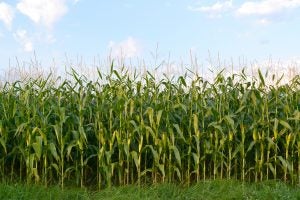I came across this article recently, and after reading it, I left scratching my head a bit.
When you read it, the farmer states that he made the switch to organic corn specifically so he could make more money. Makes perfect sense, right? But after lower yields and a higher carbon footprint, will he really make greater profits? Let’s take a look:
He claims his organic corn will yield about 30 to 40 bushels per acre. Forty bushels is astonishingly low compared to modern corn genetics, which can easily yield over 200 bushels per acre. I know that this is a ballpark number and yields can vary, but this also rings true for nonorganic yields. Regardless, it looks like GMO field corn would have about four to five times the yield. Hmm …

OK. Let’s keep this thought aside for a minute and examine the other input costs.
When you compare, say, genetically engineered seeds at about $200 an acre, organic seed costs are clearly a better choice in terms of affordability at only $45 an acre. Score! He then applies three tons (6,000 pounds) of duck or chicken manure at $75 per acre, and approximately $30 per acre by spraying organic insecticides several times.
So he’s invested about $150 per acre thus far, not including irrigation (if needed) or other inputs such as harvest costs and fuel. He then claims that some of his seeds were eaten by wild pigs and had to replant 80 acres and that it was difficult to make the switch to organic dealing with more than 80 pages of paperwork that mean time, costs, and energy. OK.
On our farm, we grow about 750 acres of genetically engineered corn, as well as several other row crops. I took a look at what our input costs are on our fields where we plant GMO corn and wanted to compare, just out of curiosity. Shoot, if organic is so much better in terms of profits, I’m “all ears!” (See what I did there?) Our costs per acre are listed as followed:
Seed costs about $200 per acre, herbicide spray $50 per acre, and fertilizer is $140. So, we clearly have a lot more money invested per acre, around $390 per acre, almost double the cost of organic. But we get five times the yield.
So if you do the math:
- Organic: 40 bushels @ $10.50 a bushel = $420 per acre. Subtract input costs of $150, and you end up with $270 per acre.
- GMO: 220 bushels @ approximately $3 a bushel (yes grain prices are not very good right now!) = $660 per acre. Subtract input costs of $390, and the final total is $270 per acre.
So it appears to be the same! Granted, yields can vary and market prices can vary, but it appears as though organic corn requires 12 times more fertilizer, which is manure based. Is this better for the environment? I’m sure organic also has a higher carbon footprint, using more fuel, tillage, fertilizer, and insecticides. Also, generally speaking, modern herbicides are quite safer than insecticides, and applied less frequently. Keep in mind that both GMO and organic farmers use the same conservation principles such as cover crops, soil testing, and crop rotation. Higher yields are important because the population continues to grow by 200,000 people every day, and we will need feed, food, fuel, and fiber for these people while preventing deforestation and using fewer inputs to protect the planet.
Now, in no way is this meant to be an attack on organic corn. I’m just genuinely curious and looking at it from the perspective of the devil’s advocate. I could be missing something and in no way is this meant to pick on the organic farmer in this article. I’m sure he’s learning and is very good at what he does. However, I can’t help but wonder if this is a way for food corporations to get richer at the farmers’ expense. A lot of organic grain farmers I’ve met are switching back to conventional because the promise for more money doesn’t always pull through.
There’s quite possibly a reason why a majority of grain farming is not organic. Is it because organic brings greater challenges? Lower yields, greater inputs, greater threats of pests and disease, more paperwork and certification, more pesticide application? Or is there really that much more of a benefit to organic? You decide.
Did you like what you read? Sign up here in a heartbeat to get the best from AGDAILY.com!



